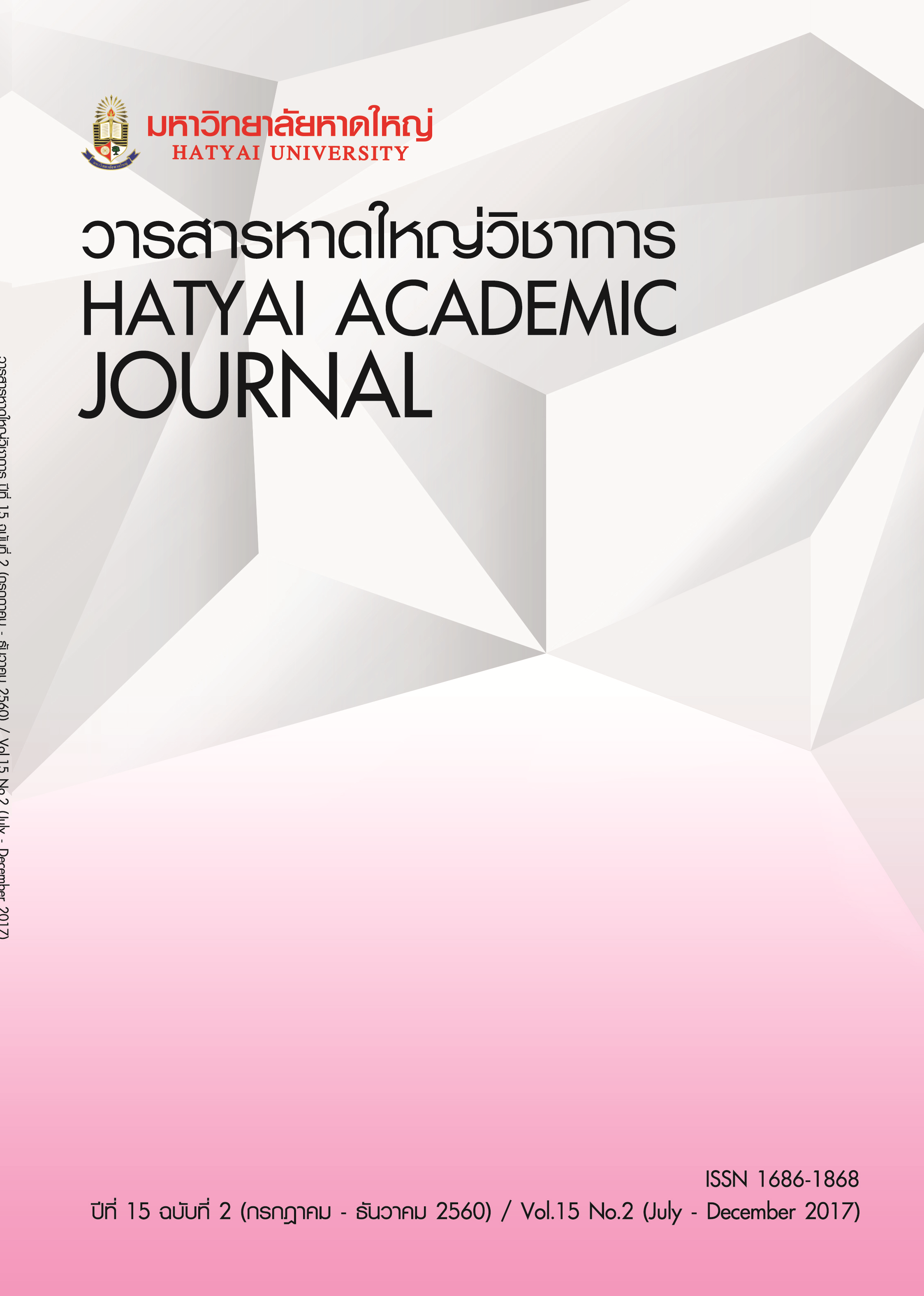การเสริมสร้างความมั่นคงทางอาหาร และความยั่งยืนในอาชีพของครัวเรือนประมงพื้นบ้านชายฝั่งในจังหวัดตรัง
Main Article Content
Abstract
This research aimed to study factors that directly and indirectly influence the enhancement of food security and sustainability of occupation for artisanal fishing households in Trang coastal areas. The data were collected from the sample of 240 members of coastal artisanal fishing households in the districts of Sikao, Kantang, Had Samran, and Palian of Trang Province. The research instrument was a structured interview schedule and the data were analyzed by the use of factor analysis and step-wise multiple regression analysis. The research findings reveal that the factors that have a direct affect on food security the most include accessibility, stability, utilization, and self-sufficiency dimensions, respectively. The accessibility dimension has an indirect effect on food security dimension through the utilization and stability dimensions. The utilization dimension has also served as an intervening variable that causes an indirect effect on food security in the self-sufficiency, accessibility and stability dimensions. The stability dimension has an indirect influence on food security through the utilization and accessibility dimensions. Strengthening food security can be achieved in two dimensions: 1) increasing consumption products prior to distributing them to their marketing channels and reducing debts in the accessibility dimension; and 2) managing land and human resources in the utilization dimension. Creating sustainability of occupation can be achieved in four dimensions: (1) increasing availability of fishing gears and reducing the travel distance for harvesting marine life in the accessibility dimension; (2) increasing fishing gear efficiency to the fishing needs in any season and responding to the coastal artisanal fishing households’ requirements as suggested by the Fisheries Department through a participatory process in the stability dimension; (3) focusing on building the community’s awareness for conservation of mangroves and marine resources and engaging the coastal artisanal fishing households to participate with the government sectors in designating the areas under protection and that for artificial reefs in the utilization dimension; and (4) fertilizing natural resources and reducing the portions of foods bought from markets or shops in the self-sufficiency dimension.
การวิจัยครั้งนี้มีวัตถุประสงค์เพื่อศึกษาปัจจัยที่มีอิทธิพลทั้งทางตรงและทางอ้อมต่อการเสริมสร้างความมั่นคงทางอาหาร และความยั่งยืนในอาชีพของครัวเรือนประมงพื้นบ้านชายฝั่งในจังหวัดตรัง โดยเก็บข้อมูลจากกลุ่มตัวอย่างครัวเรือนประมงพื้นบ้านชายฝั่งที่อาศัยอยู่ในอำเภอสิเกา อำเภอกันตัง อำเภอหาดสำราญ และอำเภอปะเหลียน จำนวน 240 ครัวเรือน ด้วยแบบสัมภาษณ์แบบมีโครงสร้าง วิเคราะห์ข้อมูลด้วยวิธีการวิเคราะห์องค์ประกอบ (Factor Analysis) และวิเคราะห์ความถดถอยพหุ (Multiple Regression Analysis) ด้วยวิธี Stepwise ผลการวิจัยพบว่า ปัจจัยที่มีอิทธิพลทางตรงต่อความมั่นคงอาหารมากที่สุด คือ มิติการเข้าถึง มิติเสถียรภาพ มิติการใช้ประโยชน์ และมิติความพอเพียง ตามลำดับ โดยมิติการเข้าถึงมีอิทธิพลทางอ้อมต่อความมั่นคงทางอาหารผ่านตัวแปรมิติการใช้ประโยชน์ และมิติเสถียรภาพ ส่วนมิติการใช้ประโยชน์ เป็นตัวแปรคั่นกลางที่ทำให้เกิดอิทธิพลทางอ้อมของมิติความพอเพียง มิติการเข้าถึง และมิติเสถียรภาพ ขณะที่มิติเสถียรภาพมีอิทธิพลทางอ้อมต่อความมั่นคงทางอาหารผ่านตัวแปรมิติการใช้ประโยชน์ และมิติการเข้าถึง การเสริมสร้างความมั่นคงทางอาหาร ทำได้ใน 2 มิติ คือ 1) การเพิ่มปริมาณผลผลิตเพื่อใช้ในการบริโภคก่อนนำไปจำหน่าย และการลดภาระหนี้สิน ในมิติการเข้าถึง 2) การจัดการทรัพยากรที่ดิน และการจัดการทรัพยากรมนุษย์ ในมิติการใช้ประโยชน์ การสร้างความยั่งยืนในอาชีพ ทำได้ทั้ง 4 มิติ คือ (1) การเพิ่มความพร้อมของเครื่องมือประมง รวมถึงการลดระยะทางในการจับสัตว์น้ำลง ในมิติการเข้าถึง (2) การเพิ่มเครื่องมือประมงให้สามารถทำประมงได้ทุกฤดูกาล และการส่งเสริมของกรมประมงควรตอบสนองความต้องการของครัวเรือนประมงพื้นบ้านผ่านกระบวนการมีส่วนร่วม ในมิติเสถียรภาพ (3) ควรมุ่งเน้นความตระหนักรู้ของคนในชุมชนต่อทรัพยากรป่าชายเลนและทะเล ส่วนการกำหนดพื้นที่อนุรักษ์ต้องให้ครัวเรือนประมงพื้นบ้านมีส่วนร่วมกับภาครัฐในการกำหนดแนวปะการังเทียม ในมิติการใช้ประโยชน์ และ (4) การเพิ่มความอุดมสมบูรณ์ของทรัพยากรธรรมชาติ รวมทั้งลดสัดส่วนการซื้ออาหารจากตลาด และ/หรือร้านค้าลง ในมิติความพอเพียง
Article Details
All published articles are evaluated by three qualified peer reviewers from various institutions through a double-blind process, where reviewers do not know the authors’ identities and authors do not know the reviewers’ identities. The content and articles in the Hatyai Academic Journal reflect the authors’ views only and are neither the opinions of the editorial board nor the responsibility of Hatyai University. The Editorial Board of the Hatyai Academic Journal allows articles to be reproduced for academic purposes, on the condition that the original source is clearly cited.


